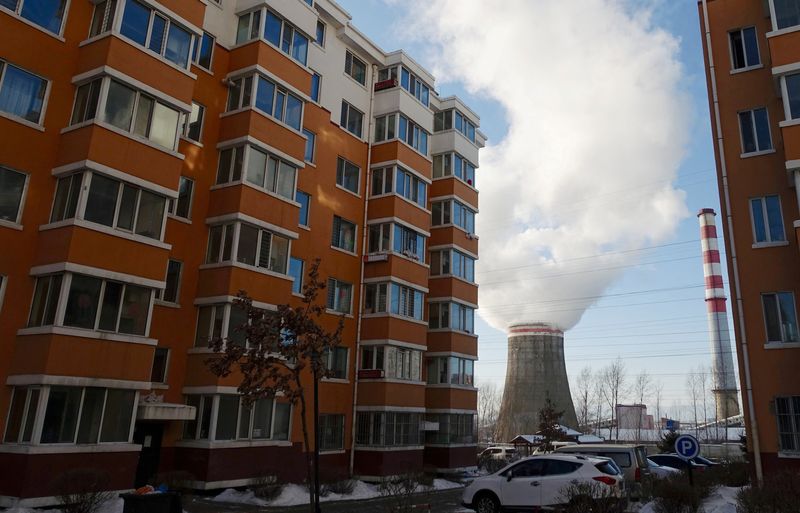By Ella Cao and Ryan Woo
BEIJING (Reuters) - Chinese homebuyers on a tight budget have long sought out Hegang, an ex-coal boomtown on the Russian border. Now, as China's property crisis spreads, Hegang's basement prices are showing up in wealthier regions in a new threat to the economy.
Average prices of new homes in 70 major cities including Beijing slumped for the 14th month in August despite dramatic reversals in China's once-restrictive purchase policies. Even prices in the economically vibrant south have sunk, stoking intense social media discussions on widening property deflation, with hashtags "Hegang-isation" and "HegangHomePrices" chalking up tens of millions of views.
In Huizhou, a southern city with a once-thriving property market due to its proximity to Shenzhen and its abundance of sea-view apartments, newlyweds Wendy Ye and her husband in 2021 paid 11,000 yuan ($1,551) per square metre for a flat. The value of their home has since dropped by a staggering 45.5% to 6,000 yuan per square metre.
The sharp decline has turned the couple's investment into a source of constant stress, made worse by a hefty 9,000 yuan monthly mortgage on a second flat in Shenzhen. With a recent cut in her salary compounding matters, Ye, a primary school teacher, said she was considering borrowing from her parents to ease some of the financial pressure.
"I'm trying not to dwell on the diminished equity for now, but the mortgage pressure is heavy," Ye told Reuters.
Across China, average home values have tumbled nearly 30% from their 2021 highs after authorities clamped down on excessive debt among developers in the summer of 2020. That sparked severe cash crunches and led to incomplete projects, defaults and even public protests by homebuyers, hammering market sentiment.
REGIONAL IMPACT
The protracted property downturn has eroded the wealth of Chinese households, which often count their homes as their single largest investment, chilling domestic demand and undermining growth in the world's second-biggest economy.
Retail sales, a key gauge of consumption, rose just 2.1% in August, compared with around 8% growth pre-COVID.
"It's very difficult to expect households to confidently spend if their biggest asset is falling in value every month," said Lynn Song, chief China economist at ING.
Plunging prices of new and existing homes in southern China could also set off a chain reaction affecting the country's largest provincial economies including Guangdong, analysts warn.
A new wave of reluctant homebuyers would hammer the sales of China's biggest developers, many of which are headquartered in Guangzhou and other southern cities, reining in their investment plans.
"A drop of 10% in China's overall real estate investment a year could directly drag down gross domestic product by 1.5%," said Ma Hong, senior analyst at GDDCE Research Institution.
The reluctance to invest will also slow developers' purchases of land from local governments.
Reduced land sales will further weaken the financial positions of local governments, particularly hitting the funds available for investment in local economies, Ma said.
'NOT A UTOPIA'
Once a bustling coal city that helped fuel China's industrialisation, Hegang has become its cheapest property market in recent years due to a decline in its mining and industrial sectors and a population outflow. Prices average 1,878 yuan per square metre, according to Anjuke, a major Chinese real estate pricing platform.
Some still view Hegang's cheap homes as a paradise for young people on small salaries. Phrases like "30,000 to buy a suite in Hegang" and "come to Hegang to lie flat" remain popular hashtags on social media.
But in the south, low property prices are seen not as an incentive to buy but as a sign of the broader economic malaise and a red flag for home buyers.
In Guangdong, China's biggest provincial economy, prices in cities like Jieyang, a small textile centre, and Qingyuan, a local logistics hub, have already dropped to Hegang levels.
A 132-square-metre flat in Jieyang can be had for 238,000 yuan (1,831 yuan per square metre), and a 110-square-metre unit for 148,000 yuan (1,345 yuan per square metre), local real estate agents told Reuters.
In Qingyuan, average prices have slid 23.9% since late 2019 before the pandemic and prior to Beijing's clamp-down on debt among developers, according to Anjuke data.
"Qingyuan is showing signs of becoming like Hegang," said a Qingyuan resident surnamed Yu, 20.

"The city's reliance on a single industry and lack of job opportunities have led to a population outflow and a vicious cycle. Young people see it as a trap, not a utopia."
($1 = 7.0930 Chinese yuan renminbi)